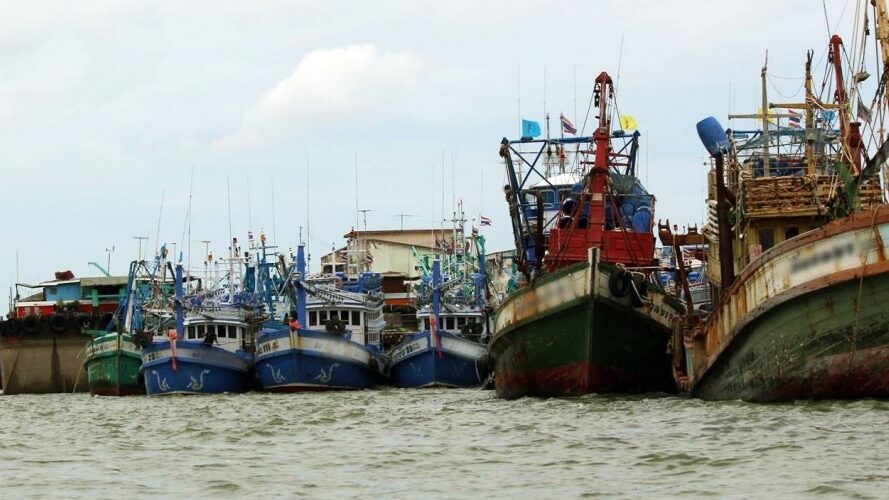Trafficking Conviction Brings Justice, Thai-Cambodian Border
Slavery
On May 7, 2019, a Thai judge found a Cambodian national guilty of trafficking five Cambodian victims into forced labor in Thailand’s fishing industry. This landmark conviction marks the successful prosecution of the first forced labor trafficking case that IJM brought forward to Thai law enforcement, and the second conviction IJM has supported surrounding Thailand’s massive fishing industry.
As a Thailand port-based trafficker, Vanna collaborated as a key player within a cross-border trafficking network responsible for transporting hundreds, if not thousands, of Cambodian migrant workers, and selling them to captains and owners of Thai fishing vessels. Eight of his Cambodia-based accomplices have already been convicted by Cambodian courts in related IJM cases.
Criminal Trafficking Network Stretches Across Nations
Over the past two years, IJM supported a group of human trafficking survivors victimized by this network in building sustainable lives of freedom after exploitation and collaborated to bring this case to Thai and Cambodian authorities. IJM also partnered with the Department of Special Investigation (DSI) in Thailand to secure Vanna’s arrest in June 2018.
During the trial, the five Cambodian survivors shared that Vanna had held them in his house in Samut Prakan, Thailand, for several days before brokering their sale onto fishing vessels bound for Malaysian waters. Vanna received large payments for each of the men from the Thai boat owners. The men quickly discovered the traffickers, including Vanna, had deceived them. None of the men received their wages. The boat captains informed them they had to work to pay off their debt, because they had been sold.
Each of the men had their passports confiscated and held. They often survived on only a few hours of sleep and were forced to work even when sick. Two of the men were physically beaten, while all of the men experienced emotional and psychological abuse.
Strong Collaboration Brings New Momentum in the Fight Against Trafficking
This significant event represents the first IJM-supported case to be prosecuted and to result in convictions of trafficking criminals operating on both sidesof the Thailand-Cambodia border, a major trafficking corridor into the Thai fishing industry. Vanna was sentenced to nine years of imprisonment for his role in trafficking the men and conspiring with others to traffick and exploit them. The sentence was reduced to six years for his cooperation during the investigation. The court also ordered Vanna to pay around 500,000 baht in compensation to each victim in the case (approx. $15,000).
In addition to the court-ordered compensation, each of the five survivors were also awarded victim compensation from the Thai government’s trafficking in persons fund—the first time this has been awarded to survivors residing outside of Thailand, and a significant milestone in securing justice for survivors of trafficking. Unlike most trafficking cases, the five survivors did not stay in Thai government trafficking victim shelters during the legal process, but instead requested time off work from their new jobs in Cambodia and returned to Thailand to participate freely in the case with assistance from DSI and IJM. The survivors received compensation calculated at the Thai minimum wage rate for each day they were working in exploitation, plus additional compensation.
“This is a landmark case because it underscores that justice for men in the Thai fishing industry is possible, despite a complex, deceptive cross-border trafficking network,” said Andrey Sawchenko, Field Office Director, IJM Bangkok. “We congratulate the Thai and Cambodian authorities, especially our partners in Thailand, including DSI, the Office of the Attorney General, and the Ministry of Social Development and Human Security. We are hopeful that strong collaboration in this region will protect workers by showing there will be consequences for trafficking.”
Low Number of Cases Highlights Challenges in Tackling the Complex Crime
In Thailand, prosecutions of cases of forced labor trafficking on Thai fishing boats are rare—and convictions are even rarer. In 2017, the last year in which Thai government data is available, only 2% of trafficking prosecutions in Thailand were in cases of forced labor on fishing boats. And when trafficking cases are successfully prosecuted, the sentences tend to be low: only 33% of trafficking convictions resulted in sentences of longer than 10 years’ imprisonment in 2017.
Additionally, cross-border cases require immense collaboration and coordination across national governments. Pol. Maj. Arit Tatsaphan, Director of DSI’s Bureau of Human Trafficking Crime Division 3, spoke to this challenge: “One challenge presented was communication—communicating with the survivors [based in Cambodia] and following up with them for all of their interviews, due to the fact that the survivors [in this case] are foreigners. To meet this challenge, we received assistance from IJM both in Thailand and Cambodia, particularly in coordinating with Cambodian law enforcement who helped support this case, and in gathering evidence.”
The low number of cases and difficultly in securing a conviction, especially in complicated, cross-border forced labor trafficking cases, highlights the important work still left to do in combatting this crime and the importance of strengthening cross-border collaboration between Thai, Cambodian and Malaysian government authorities.
“In Thailand, prosecutions of cases of forced labor trafficking on Thai fishing boats are rare—and convictions are not common, making this conviction even more significant,” added Andrew Wasuwongse, Deputy Director at IJM Bangkok.
“But there are still thousands of victims forced to work on fishing vessels and in seafood processing centers who are in need of rescue, and are waiting for justice to be served. We are resolved to work together to fight this crime.”
This precedent-setting conviction was made possible through investments by the Walmart Foundation and the U.S. State Department’s Trafficking in Persons Office.